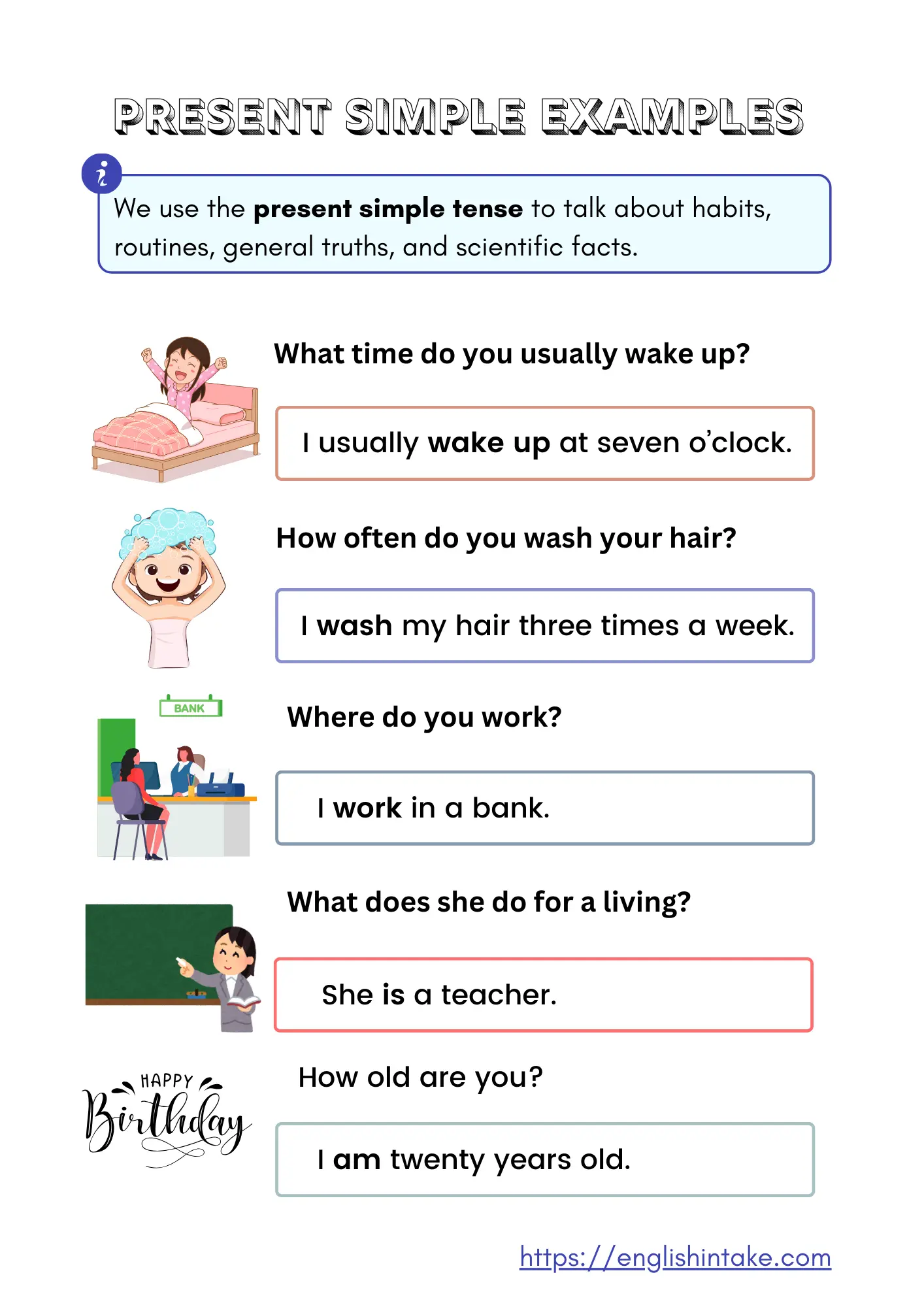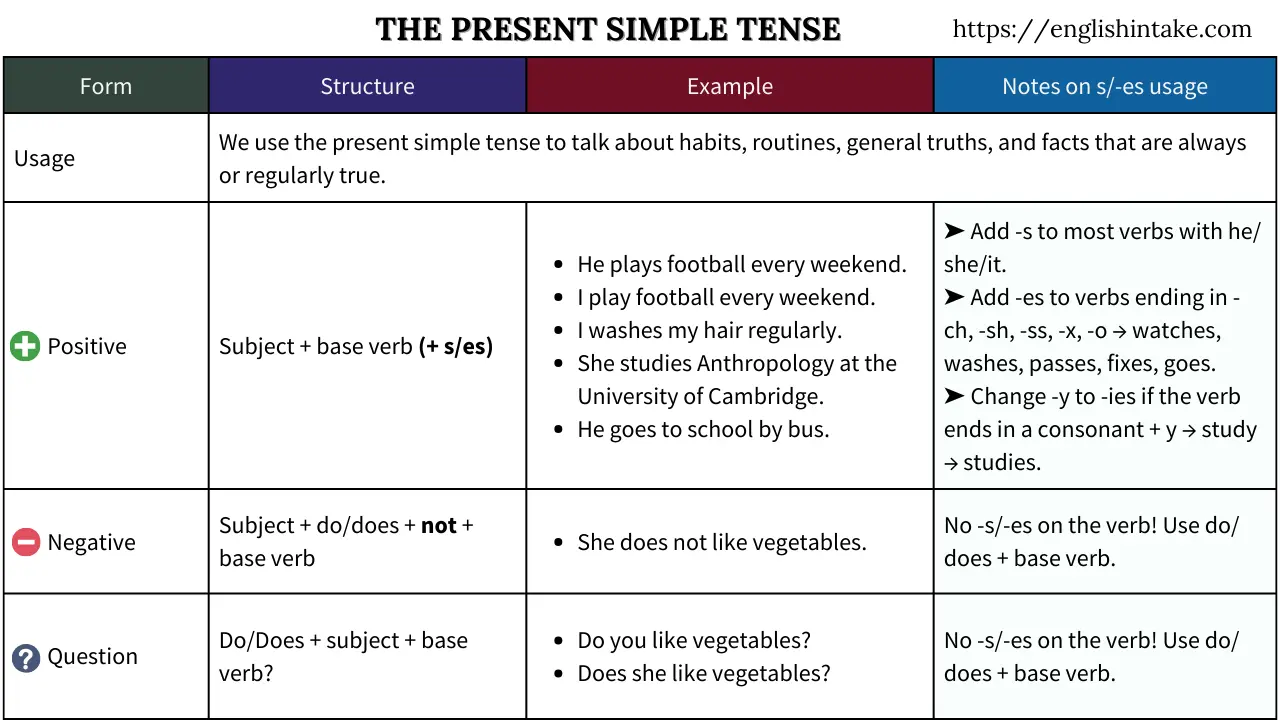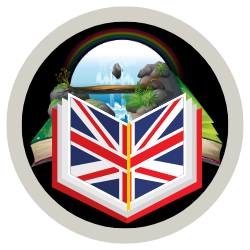Table of contents
1. What is the present simple tense?
The present simple tense describes habitual actions, scheduled events, and something that is always true or permanent.

2. Present simple chart
The Chart below summarises the use of the present simple tense for the various cases described in the next section.
| Use case | Subject | Verb form | Present simple sentences | ||
|---|---|---|---|---|---|
| Affirmative | Negative | Question | |||
| General truths | I/You/We/They | learn | We usually learn from our mistakes. | We do not usually learn from our mistakes. | Do we learn from our mistakes? |
| He/She/It | bark | Dogs usually bark at strangers. | My dog does not always bark at strangers. | Does your dog usually bark at strangers? | |
| Something that is true in the present | I/You/We/They | work | I work at home today. | We do not work today. | Do you work at home today? |
| He/She/It | be | She is in the office. | He is not in the office. | Is she in the office? | |
| Something that is always true | I/You/We/They | boil | Water boils at 100°C. | Water does not boil at 10°C. | Does water boil at 100°C? |
| He/She/It | orbit | The Earth orbits the Sun. | The Earth does not orbit Mars. | Does the Earth orbit the Sun? | |
| Habits | I/You/We/They | go | They go to the gym every day. | They do not go to the gym every day. | Do they go to the gym every day? |
| He/She/It | goes | He plays soccer every weekend. | He does not play soccer every weekend. | Does he play soccer every weekend? | |
| Scheduled events | I/You/We/They | arrive | They arrive at 6 p.m. | They do not arrive at 6 p.m. | What time do they arrive? |
| He/She/It | arrives | She arrives at 6 p.m. | She does not arrive at 6 p.m. | What time does she arrive? | |
| Permanent states or situations that are not temporary |
I/You/We/They | live | They live in London. | They do not live in London. | Where do they live? |
| He/She/It | lives | She lives in London. | She does not live in London. | Where does she live? | |
3. How to form the present simple tense in English?
For I, you, we, and they, we use the base form of the verb to form the present simple tense in English.
- I love you.
- You look beautiful.
- We provide assistance to socially disadvantaged people.
- They eat rice every day.
For he, she, and it, we add an ‘s’ or ‘es’ to the base form of the verb. See the present simple rules' section for more details.
| Base form | Present simple form (He/she/It) | Present simple sentences |
|---|---|---|
| believe | believes | She believes in God. |
| eat | eats | She eats rice every day. |
| forget | forgets | He forgets things easily. |
| make | makes | It makes sense. |
| go | goes | He goes to the gym every morning. |
| watch | watches | She always watches TV after dinner. |
| fix | fixes | He fixes cars on weekends. |
4. Present simple tense uses
We use the present simple tense to talk about routines and habits, express general truths, describe scheduled events, state permanent situations, and convey something that is always true.
Talking about routines and habits
Examples
- She always takes the bus to school.
- We go hiking every Sunday.
- How do you go to work?
- What time do you usually go to bed?
- I leave my house at about 8:30 am to go to work.
- She spends about 20 minutes in the bathroom every morning.
- On weekends, I take a nap after lunch.
- I wash my face every morning.
Expressing general facts
We use the present simple to talk about:
- Personal facts and identity (I am British.)
- General truths and universal facts (Water boils at 100°C.)
- Permanent situations (He works at the bank.)
- Scientific facts and natural laws (The Earth orbits the sun.)
Common words and phrases used with general facts:
- always
- usually
- generally
- every day
- every week
- never
- rarely
- often
- in summer
- in winter
Example sentences: general facts & universal truths
🌍 Personal facts & identity
- I am British. (A fact about nationality.)
- My favourite colour is red. (Personal preference.)
- He lives in London. (A permanent place of residence.)
🔬 Scientific facts & natural laws
- Water boils at 100°C. (A universal truth.)
- The sun rises in the east and sets in the west. (A natural fact.)
- Plants produce oxygen through photosynthesis. (Scientific truth.)
🏢 Permanent situations & work facts
- She works at a hospital. (Her job does not change regularly.)
- He owns a small business. (A long-term fact.)
- My father teaches mathematics at a university. (Permanent profession.)
- I am Spanish.
- My favourite singer is Jimi Hendrix.
- He works at the bank.
- The sun generates solar winds.
- The museum is closed on Sundays.
Talking about schedules or fixed future events
The present simple tense is commonly used to talk about schedules, timetables, and fixed future events. This is because these events follow a predetermined plan, making them unchangeable in most cases. Thus, we can use the present simple to talk about:
- Public transport schedules (The train leaves at 22:00.)
- Work or school timetables (The meeting starts at 9:00.)
- Appointments and events (I have an appointment at 8:00.)
- Planned departures and arrivals (We leave at noon.)
Common words and phrases used with schedules:
- at + time (at 8:00, at 10:30, at midnight, at noon)
- starts / ends / finishes / leaves / arrives
- On Mondays
- every day
- next week
- tomorrow
Example sentences for fixed future events:
🚆 Transport schedules
- The last bus to Paris leaves at 22:00.
- The flight to Madrid departs at 6 a.m. tomorrow.
- The bus arrives at the station at 7:15 every morning.
📅 Work, school & appointment schedules
- I have a meeting with my manager this afternoon. (Fixed time.)
- What time is your appointment with the dentist? (Asking about a fixed event.)
- Our meeting starts at 9:00. (Pre-arranged schedule.)
🏡 Fixed personal plans
- We plan to leave early in the morning. (A decision that follows a schedule.)
- The concert begins at 8 p.m. (Public event schedule.)
- Her yoga class finishes at 5 p.m. (A scheduled class.)
- The last train to London leaves at 22:00.
- I have an appointment at 8:00.
- What time is your meeting with the manager?
- The shop closes at 8:00 p.m.
- We plan to leave at noon.
Expressing the frequency of events
We use the present simple to express how often something happens over a period of time, such as:
- Habits and personal routines (She never lies to me.)
- Work schedules and updates (The database is updated every three months.)
- Events that occur regularly (The train passes once an hour.)
- Natural and seasonal events (The temperature seldom drops below 8°C in winter.)
Common frequency adverbs used in present simple
- always (100%)
- usually (80%)
- often (60-70%)
- sometimes (50%)
- rarely / Seldom (10-20%)
- never (0%)
Common time phrases for frequency:
- every day
- every other day
- every week
- every summer
- once a week
- twice a month
- three times a year
- on Mondays
- in the morning
- in winter
Example sentences:
🛑 Negative frequency statements
- She never lies to me. (Lying = 0%.)
- I rarely walk to school. (Walking to school almost never happens.)
- The temperature in this region seldom drops below 8°C in the winter. (Very uncommon event.)
📅 Regularly occurring events
- I practice yoga once a week. (Habit.)
- My grandfather goes for a walk once a day. (Daily routine.)
- British Airways flies from London Heathrow to Wroclaw twice a week. (Scheduled event.)
🙍 Personal and social habits
- My son often listens to loud music. (Happens frequently.)
- Our hotel is usually fully booked in summer. (Regular seasonal trend.)
- My parents always tell me the truth. (100% true all the time.)
- She never raises his voice to me.
- I rarely take the bus to school.
- He sometimes falls asleep during my English class.
- The train to Hamburg passes once an hour.
- I practice yoga once a week.
- My grandfather goes for a walk once a day.
- My father shaves every other day.
- My son often listens to loud music.
- Our hotel is usually fully booked in summer.
- The temperature in this region seldom drops below 8°C in the winter.
- My parents always tell me the truth.
5. Rules
General rules
For most verbs, we add -s in the 3rd person singular (He/She/It).
- work => works: He works at night.
- take => takes: She takes a short walk every morning.
- give => gives: It gives me pleasure to help other people.
We add -es for verbs ending in -s, -sh, -ch, and -x in the 3rd person singular (He/She/It).
- fetch => fetches: Sarah fetches her daughter at school at 4:30 pm.
- impress => impresses: He always impresses me.
- mix => mixes: He often mixes English and Spanish.
For verbs ending in consonant + -y, change -y to -ies in the 3rd person singular (He/She/It).
- study => studies: He studies English with my daughter.
- cry => cries: She cries like a baby.
- carry around => carries around: She often carries around a gun.
For verbs ending in vowel + -y, simply add -s in the 3rd person singular (He/She/It) as normal.
- obey => obeys: The dog obeys his master.
- pray => prays: Alan prays three times a day.
- enjoy => enjoys: She enjoys spending time with her daughter.
Exceptional rules of the present simple tense
❗ Irregular verbs do not follow standard conjugation patterns and must be memorised.
- go → goes: He goes to school by bus.
- do → does: She does her job very well.
- have → has: She has four siblings.
6. Important notes
❗Note that we use every + singular noun:
- Every child needs to feel loved. Every children need to feel loved.
- I shave every day. I shave every days.
- Every student has the capacity to learn. Every students have the capacity to learn.
❗We use singular verbs with the indefinite pronouns everyone, everybody, everything and everywhere:
- Not everybody wants to be rich. Not everybody want to be rich.
- Everyone needs friendship and love. Everyone need friendship and love.
- Is everything alright? Are everything alright?
- Everywhere is dark when the night comes. Everywhere are dark when the night comes.
7. Some tips and tricks
Time expressions: words like “always”, “sometimes”, “often”, “never”, “every day”, “rarely” and “once a week” are often used with the present simple tense.
- I always wake up at 6 a.m.
- She sometimes eats ice cream.
- I rarely take the train to go to school.
- We visit our parents once a week.
Verbs “to be” and “to have”: with the verb “to be” and “to have”, the present simple form is a bit different than what we have seen so far. For the verb “to be”, we say:
- I am.
- You are.
- He/She/It is.
- We/They are.
- I am late.
- Are you married?
- He is old.
- They are my friends.
For the verb “to have”, we say:
- I have.
- You have.
- He/She/It has.
- We/They have.
- I have a car.
- You have a beautiful house.
- She has a boyfriend.
- We have a few friends in the city.

Now, try to make your own sentences with the present simple tense. Think about things you do every day or facts you know. The more you practice, the better you will get!

